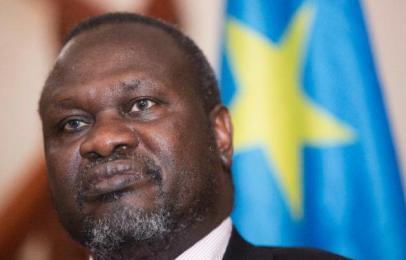S. Sudan’s armed opposition launches ruling party’s Ethiopian chapter
By Tesfa-Alem Tekle
November 8, 2015 (ADDIS ABABA) – South Sudan’s armed opposition faction led by first vice president designate Riek Machar announced on Sunday the establishment the first ruling Sudan’s Peoples Liberation Movement (SPLM) party chapter in Ethiopia.

Ethiopia currently hosts the largest number of South Sudanese refugees who crossed borders into the country to escape the December 2013 outbreak of conflict in the young nation.
The chapter has an aim of galvanising support from the South Sudanese community in Ethiopia towards the full implementation of the final peace accord signed in August between SPLM-led government and its opposition faction SPLM-IO.
The Addis Ababa SPLM chapter which is a political wing for political mobilization will also be engage in post-conflict reconciliation and healing back-up activities.
“We will use chapter to mobilize South Sudanese to rally behind the people’s movement and at the same time use it to embark on reconciliation and healing activities among South Sudanese communities’’ said Koat Gatkuoth Thoat Interim Chairperson of the charter.
“We also would establish contacts with other political groups and communities in order to create forums to discuss ways to bring back our people to loving each other and forget the pasts to coexist” he added.
The chapter was established under the order of the former vice president turned rebel leader, Riek Machar.
Koat called on all South Sudanese to embrace each other and begin to work for the recently compromised peace agreement.
“The time of war must end and start to reconcile our masses and this must start now” he added.
MIXED REACTIONS
The final Security Arrangement between South Sudan warring factions was signed earlier this week following the compromised peace agreement signed in August that aimed to end two years long conflict in the youngest nation.
Agreement on security signed means the two sides would now start a real implementation of the permanent ceasefire and set up a transitional government before mid January 2016.
However South Sudanese in Ethiopia have mixed reaction over the peace agreement.
Approached by Sudan Tribune, South Sudanese in Addis Ababa although they welcome the signing by the warring factions but they doubt the signatory parties would take a firm a commitment to translate the agreement in to practice.
There were no celebrations here or at the camps over the recently signed agreement.
Most of the exiled South Sudanese say they will only start celebrations when both sides put letter in to action and implement the agreement faithfully.
“The signing as usual is not an end but a mean to halt the unrest. I encourage all of us (South Sudanese) to support our leaders on this critical implementation” said Gatwech Koak Nyuon.
CALL FOR MONITORING
Meanwhile, a South Sudanese advocacy group has appealed to the IGAD-Plus and the international community to closely monitor the full implementation of the agreement.
National Center for Human Right and Democratic Advocacy (NCHRDA) congratulated the people of South Sudan over the peace deal and lauded the tireless effort the IGAD-Plus mediation exerted throughout the times of the negotiations.
NCHRDA called for a tougher punishment to be imposed against any party that violates the terms of the agreement.
The group also applauded the Africa Union Commission of Inquiry (AUCISS) for the work they have done on the investigations of the crimes committed in South Sudan.
28 NEW STATES
The NCHRDA further called on President Salva Kiir to reverse the decision on creation of 28 new states.
In a statement Sudan Tribune obtained, NCHRDA chair man Gatluak Michael Diew said the unilateral decision of president Kiir violates the signed peace accord, transitional constitution, and undermines both Legislative Assembly and the Council of States.
“It’s also against the will of the people since the decision was taken by the president unilaterally without consulting any organs of the government and the citizens themselves” he said.
Diew alleged claimed the unilateral decision has already created fresh rebellion and clan fighting specially in Upper Nile Chollo land and Warrap state, leaving over 100 civilians dead.
“The created states were decreed-out without feasibility study or census. It’s also annexed ancestral lands of other communities to their neighbors almost in more than 25 of 28 states” he added.
The group called on IGAD-Plus and the international community to put more pressure on president Kiir and hid government to immediately reverse the order issued on 2 October.
(ST)
